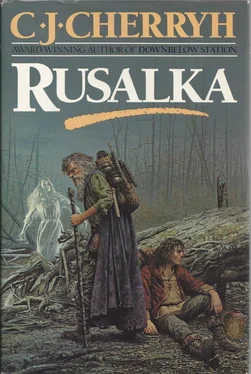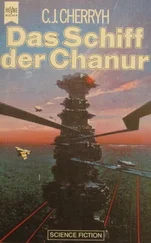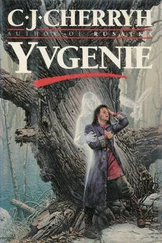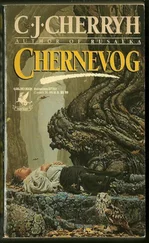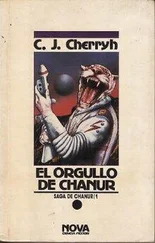Closer than that, at a black ball sitting on the leaves, panting.
“Good dog,” he said to it. Babi licked his lips and got up, expectantly, little hands clasping, then one finding the ground, pawlike.
“You shouldn’t go,” Eveshka said, and turned and put her arms about his neck, looking up into his face. “Pyetr, please, no, I’m—not—strong enough—”
Babi growled and of a sudden jumped up and grabbed his sleeve—pulled him sharply aside, for which a man could be quite resentful, except he saw Eveshka flit and stop a little removed from him, hands clasped together, pain on her face.
“I—can’t,” she said, “I can’t not want you, and you know what that does to us.—Babi, keep him, watch him—”
Pyetr tugged to get his sleeve free. “Babi, stop it!” He knew what she was up to, where she was going as she started away. “ ’Veshka, no!”
She paused, looked back over her shoulder, paler, much paler once she had crossed that boundary of living woods and dead. And it was not his gentle Eveshka looking back at him with that cold, resolute anger, or speaking to him in a voice so icelike still:
“I can’t kill him the way I can you: there’s no limit to him. But you’re right: a sword might. A knife. I don’t know if I can get to him, I may weaken too much. But I’ll try, Pyetr—”
Something moved among the trees behind her, something walking through the starlight, among the pale, barkiess trunks. “ ’Veshka,” he said, shaking his wrist, trying silently to urge Babi to turn loose, not wanting to make overmuch commotion and precipitate something unwanted. “’Veshka, don’t look, but there’s somebody behind you—quietly, walk back here.—Babi, Babi, dammit, turn loose—”
She did turn and look, and the gray figure came walking steadily as she began to tear into threads again, streaming away into thin air.
“’Veshka!” Pyetr said—jerked violently to tear his sleeve free: cloth ripped, but Babi held like a lump of iron, seized his wrist with his hands, strong as chain, as Eveshka dimmed and dimmed. Babi began to pull him away, but of a sudden he wanted to go toward that ominous figure, and of a sudden Babi’s grip slipped, releasing him.
He caught his balance, walked across the boundary, stopped beside Eveshka all the while knowing he had made a grave mistake in his plans against Chernevog—knowing that Chernevog had wished him here all along, ahead of his companions, and a sword could do very little, when Chernevog wished not.
“’Veshka,” he said, feeling her attraction, too; and felt her attention—felt the touch of the threads that flowed from her and felt the delirious little jolts as his strength flowed out of him—to her, who was a wizard no less than Chernevog: “Take it all,” he said, with what breath he could spare, hoping she would go all the way to substance then: “Quickly. Take the sword…”
But she might not have heard. The theft continued the same as the flow of threads from her to Chernevog, who walked up to them, a fair-haired man younger than himself, a handsome youth with a gentle face and a smile and outstretched hand.
The hold on him broke, Eveshka’s touch stopped, sudden freedom, sudden loss: he reached, reeling in a struggle for balance, after the sword—got it from its sheath as his right leg went out from under him, and went down to his knee with the point, trembling, aimed at Chernevog’s heart.
Then his arm simply would not move further, while Chernevog brushed the blade aside to close about the hand that held the blade, Chernevog a faceless shadow against the stars, holding his hand, making him look up. “You don’t want to hurt me,” Chernevog said, the way Sasha would wish at him, just as gently, just as subtly: nothing wicked could be that gentle, or that reassuring, and he could not move.
Then it seemed for a heart-stopping moment the touch of a snake, and he recoiled, finding his sword in his hand and Chernevog close enough; he grabbed at Chernevog’s arm—
But he found himself quite, quite incapable of moving then, Chernevog laying an arm along his shoulder, taking the sword ever so gently from his fingers, saying to Eveshka, “Don’t do that, ’Veshka, he’s the one will suffer for it. Do you want that?”
“No,” she said.
“I know what you’ve come for. Shall I give it back to you? I can do that. I’ve kept it very well. I knew you’d come, soon or late.”
“No!” she cried, and Pyetr wanted with all his heart to get his hands on Chernevog’s throat, but he could not, could not even though Chernevog wished him slowly to stand up and look at Eveshka.
Her face was buried in her hands, her body heaving with quiet sobs.
“She knows everything she’s done,” Chernevog said, beside him, and put an arm around him. “A heart is nothing I’d want. But I can make her happy. And you—what do you want? Your young friend safe?”
“All of us,” he muttered, knowing it was useless.
“I’ll throw in Uulamets, if he’ll be reasonable, ease poor ’Veshka’s mind—yours, too. There’s nothing so terrible about what I want. No tsar you could find so kind as I am—”
“Go to hell!” he said, and suddenly Eveshka went pale, spinning off threads of herself, faster and faster, until the starlight shone through her, until the threads wrapped themselves about him, the shocks multiplied and he heard her sobbing, “Kavi, Kavi, no!”
“On the other hand,” Chernevog said, when the sparks cleared out of his vision and he was lying numb on the ground, “you can go to hell yourself, peasant lout, much, much more easily than I.”
UULAMETS CHANTED SOFTLY, while the smoke went up, and ghosts swirled through their midst—but not within the smoke. Uulamets mixed ash and herbs into one of his small pots, then took a small flint blade and cut his wrist with it, bleeding into the bowl. “You,” he said to Sasha.
Sasha, head spinning from the smoke, set the knife to his arm and brought it sharply down. Blood made a steady drip into the pot—not so painful: but his hands shook as he gave the items back.
“Vodka couldn’t hurt,” Uulamets said, then, and unstopped the jug and took a drink and added that, too, which gave Sasha a queasy feeling as much as the bloodletting. “Don’t you know?” he asked, indignant, and Uulamets :
“No.” Uulamets stopped the jug, stirred the mix with a carved bit of bone, added moss and another powder. “It can vary.” He took a twig from the fire and poked the burning end into the pot.
It went up with a puff of fire, and Uulamets hastily danced it from one hand to the other, tamped in more herbs, then put the hollow bone into it and covered the bowl with his hand while he breathed the smoke through the bone.
He passed pot and bone to Sasha. “Breathe deep,” he said, and as Sasha did that, “deeper.—Good lad.”
His chest burned; his eyes blurred from tears as Uulamets took it back, sucked in several more puffs, then suddenly leaned forward, grasped him by the shoulder and blew smoke into his face, saying, again, “Breathe.”
He did that. He did it twice and three times, and Uulamets wished him—he felt it start—let go, breathe the smoke he breathed, deeper and deeper, back and forth—
Breathe out, breathe out, breathe out, hold nothing back—
Heart and soul, boy, breathe it out—
He was not governing his own body: Uulamets kept the breath coming out of him until he was fainting, falling against the old man’s hands.
Then Uulamets made him breathe in, larger and deeper breaths, until there were enough of them and often enough mat Sasha could clench his hands and move his limbs and know that it was his own volition, that he was back from wherever he had been—
Читать дальше
